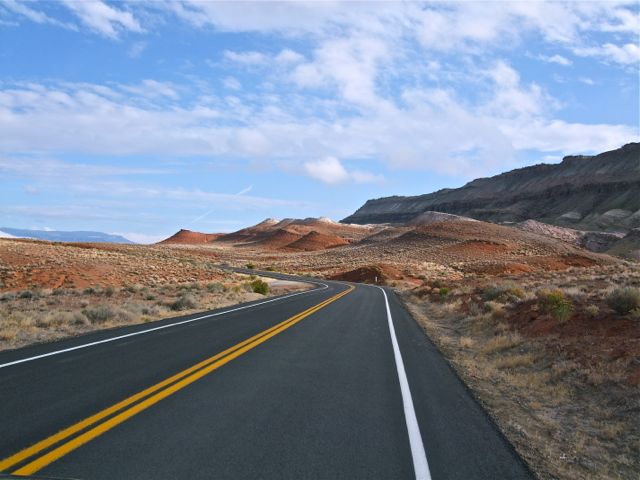
While we try not to revolve our lives around blogging, we do try to post at least 2-3 times a week. We have a list of topics we intend to write up (some evolving ideas: a general series on RV Parks & Campgrounds, thoughts on remote working, picking a cellular network, learning how to be a recipient of gifts, defining Excuses vs. Reasons, etc.).
But when I reach the end of a long week with lots of work hours, sometimes we’re just not feeling like composing a huge post. Tonight is one of those nights.
So, rather than dive into a big topic, I thought I’d post to Facebook this evening to see what questions folks had for us to answer.
Here goes!
Q1: As a fellow RV blogger, how do you conquer those times when the topic you’re writing about is more of a struggle than other topics? – Pat
All us bloggers at some point probably reach a bit of writer’s block. I know we do at least. Sometimes you just don’t feel like sharing so much, other times you just don’t feel interesting enough to write a post about, or perhaps you’re tired of putting several hours into a post. And sometimes you just have other things taking your focus. But momentum is what makes or breaks a blog – don’t post regularly, and the readership languishes. So many blogs have started and stalled. It really does take a lot of persistence to keep people coming back.
The good news is, not all posts have to be huge or topic focused. Obviously, one solution is to do like I did tonight – ask your readers what is on their mind? A previous time we did this, was one of our most read and commented on posts.
But other ideas? If we’ve been somewhere recently, a location post works. Post some photos and stories about a visit somewhere (we did this a lot when we were in St. John and just not feeling called to writing much). Or let the pets blog (but Kiki will only go for this a couple times a year… darn cats!). We also keep a list of blog post ideas, sometimes even with content pre-written – that we’ll review and see if any of them call us.
Q2: Ideas on being nomadic with a fixed job location. – Robert
For this question, I’ll actually point you to our post on Income Sources for Nomads, where we explore over 60 job ideas that are nomad compatible.
Unfortunately, the answer to this one isn’t easy. If your current job can’t be negotiated for you to somehow work remotely, then you’re faced with the decision of either transition to an income source that is nomad compatible or putting far-ranging nomadism off until you feel comfortable leaving your job.
Either that – or prepare yourself for a long and ever-changing commute!
We have encountered a good number of folks who have decided to move into an RV/boat/van anyway, but park it nearby to their current work. This gets them pared down and wheels beneath them – and presumably, one step closer to being totally location independent. But in our opinion? If you do this, give yourself a firm deadline for when you’ll get the next step figured out. Taking steps is great, but here you risk putting yourself into a potentially compromised living situation without realizing the benefits of true mobility. We’ve known far too many wannabe nomads get derailed at this point – they’re still working a job they’re not necessarily inspired by, living in tight quarters and still stuck dreaming about a future when they actually hit the road. And that can suck.
Until you’re ready to break the safety net of your reliable income source, I’m afraid it’s a toughie. And only you can really decide what is best for your situation. In the end, don’t let other’s opinions (especially ours) dictate the actions you take.
(And by the way, *choosing* to stick with your career that isn’t nomad compatible is a perfectly acceptable reason for not hitting the road. Just make sure you are choosing it, and not holding yourself back by not considering other options.)
Q3. I’ve been wondering about the modifications to the driver’s area? I remember seeing a post about adding a backup cam. Have y’all done any other mods? – Harry
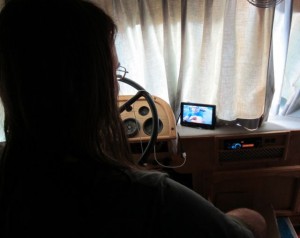 Yes, we did install a new video screen and back-up camera when we first bought the bus. An older (and broken) B&W screen had been previously mounted, and we were able to re-use the existing cable running the length of the bus by soldering new ends onto the wires.
Yes, we did install a new video screen and back-up camera when we first bought the bus. An older (and broken) B&W screen had been previously mounted, and we were able to re-use the existing cable running the length of the bus by soldering new ends onto the wires.
We choose a 7″ LCD Screen (that serves a dual use as a monitor of our battery system) and a weatherproof night vision camera.
We’ve not yet made any other modifications – but we do have big plans! Some of them may be happening pretty soon. Amongst them are:
- We eventually want to install a Stone-Bennet Electric shifter on the dash side panel that will replace the floor shifter. This will open up the possibility of replacing the driver’s seat with one that swivels and can become a living room chair while parked.
- We are deep in research on a leveling system for the bus (one that overrides the air bag’s functionality to allow us to manually level), and the control panel for that will be installed in the driver’s area.
- And at some point, we need to replace most of the gauges and all of the switches – as some of them are a bit finicky, or worse. Including the key cylinder – we’ve actually not ever taken the key out since we bought the bus since if we did it will probably never make it in again!
Q4: How ’bout what books and/or DVDs you found most helpful when you were first learning about RV’ing.
The manual that came with our RV! Chris is the sort that reads documentation from cover to cover.
Honestly, we didn’t do much research into RVing itself… we just set off and did it. Heck, we didn’t know of too many other ‘younger’ folks full time RVing when we started. But Chris had followed and became personal friends with the original technomad – Steve Roberts. And he was a huge inspiration for Chris hitting the road.
Q5: Beyond serendipity, how do you decide where to go next since outside of family/friend visits if you have no fixed schedule of places you ‘need’ to be? We have a wandering map of places we need/want to see, do you?! – Tricia
If we’re not off to visit a family member or friend, then perhaps we’re routing to an event we’re attending (Burning Man, conference, etc.). Other than that, we really do rely on serendipity. We listen for invitations to come visit readers/followers of our blog, rendezvouses with other nomads, events that just happen to pop up on our radar, or looking on a map to see what’s nearby that might be interesting.
We don’t really keep a list of places we want to see – we look at them as places to visit while enroute to visit people or attend events. And we much prefer having a place shown to us by a local and seeing it through their eyes. We really do need to get better at keeping track of all of the gracious invitations we’ve gotten – as we’re much better about the ones we can act on fairly immediately, than ones given as more open ended but far off in terms of possibility. (Psst.. that means if you’ve invited us before, and we haven’t shown up – that doesn’t mean we’re avoiding you! Please do ping us again if you see us heading your way.)
We do keep a speculative calendar where we note events we’ve heard of. So we’ll refer to that and see what cool stuff is feasible to attend when we have nothing else on the calendar.
But honestly? If we’re lacking things or places or people to see? That’s a rare and treasured moment to just embrace being homebodies. Sometimes it’s really nice to just enjoy a great view, great bandwidth and great weather…. and stay at home spending time worshipping Kiki.
Q6: If I park in a Wal Mart parking lot and spend the night, can I run my generator, if I park at the outside edge of the parking lot? – David
If your generator is well shielded so it doesn’t make much noise or exhaust, then at most places that allow overnight blacktop boondocking (such as a WalMart) – it’s generally not a problem. Just be very aware of your surroundings and try to park as far away as other RVers who might be in the same parking lot.
For us, our generator is in need of some serious work. It’s loud and stinky. We’re ashamed to run it, and go to great lengths to not inconvenience others with it. We have our alternator charging our batteries while underway (and put a lot of work and expense into making our systems as self reliant for a night or two as possible), so we arrive with our batteries topped off enough to get through the night. And if that’s not enough to get us through the night (such as we need to run the A.C. or an electric heater) – we’ll pay for a RV Park instead. So for us, as we’ve gone to such consideration – it frankly annoys us when someone parks right next to us with their loud and stinky generator running all night!
Q7: I’ve always wondered how you clean. We move things from room to room to clear out space as we clean, but how do you do it, since you’re sort of dealing with one big room. – JoAnna
Well, most of our furniture is attached, so moving it wouldn’t even be an option. The advantage of a small space is that it really encourages you to stay tidy consistently. And it doesn’t take that much time to do a total cleaning. It typically takes us about an hour to do a total cleaning of the entire RV – washing the floors (we put in vinyl to make it easier), wiping all the surfaces, vacuuming any ‘soft stuff’, dusting the blinds, cleaning the headliner, etc. If I’m feeling really endeavorous, I’ll get out the squeegee and clean all the mirrors and windows – nothing like clean mirrors and windows to really make a place shine.
The disadvantage of a small space? It can become highly disorganized in an even shorter time.
Q8: What really are the best drives in America? – JoAnna
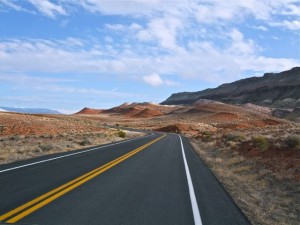 We like avoiding the interstates whenever possible. We love the blue highways where we can cruise the bus at 55 mph and not feel like we’re being slow. We like scenery that keeps the drive pretty and interesting. I can’t really think of a singular ‘best’ drive – there’s so many! We try not to drive more than 3-4 hours a day, so that we can soak in the pretty and diversity of our country.
We like avoiding the interstates whenever possible. We love the blue highways where we can cruise the bus at 55 mph and not feel like we’re being slow. We like scenery that keeps the drive pretty and interesting. I can’t really think of a singular ‘best’ drive – there’s so many! We try not to drive more than 3-4 hours a day, so that we can soak in the pretty and diversity of our country.
Q9: Did you give up on your Hughes Net dish system? – Darren
We still have it, but we haven’t had it activated since last September. Since then, we’ve been on the east side of the US, where cellular signals are much more robust. We’ve mainly been in urban areas too, and staying at campgrounds with reasonable WiFi. Most of our use of the satellite dish has been while we’re out west, especially while at Burning Man. We’ve honestly not seen the benefit of keeping it activated – we’ve had it two years now, and have only used it cumulatively around 3 months.
So wouldn’t say we’ve given up on it, but we certainly haven’t realized the full benefit of it either.
We’ll probably sell it at some point. And if we did, we’d probably immediately find ourselves long term somewhere without cellular signal!
Ok, that wraps up the questions we were posed. If you have more, feel free to leave them in the comments, and we’ll try to answer them!

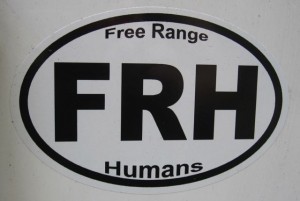
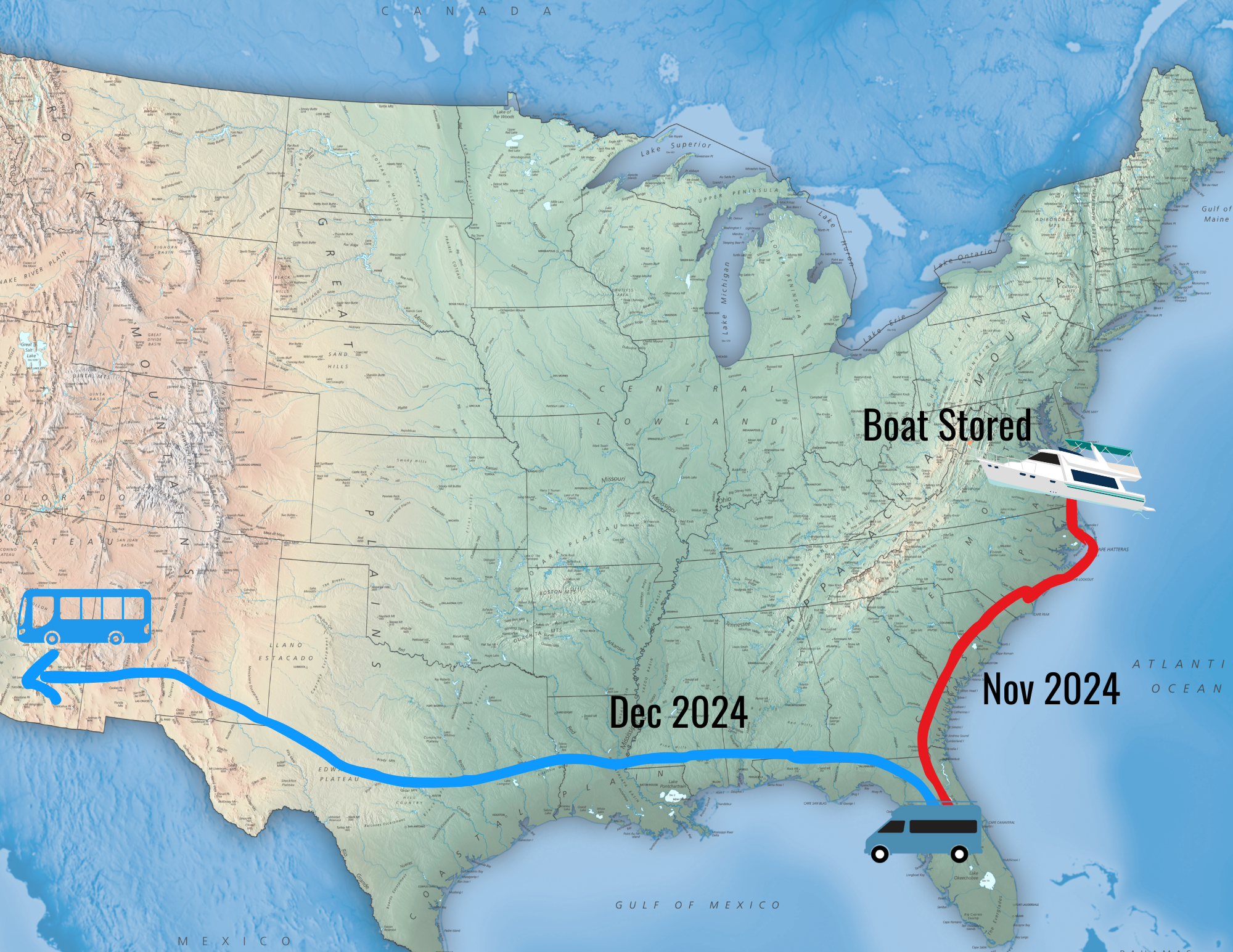
You guys are geekalicious! I stumbled on to your site today as I research ongoing full time nomadiry. I recently returned from three months in New Zealand, living and traveling in a Mazda Bongo. I intend to continue here in North America in a Class B, likely a Roadtrek.
Your site has much relevance for me. I am constructing a sustainable lifestyle traveling as I create lyrical imagery.
I hope our paths cross in the analog world as well.
Now, do who leads and which foot do you begin your happy dance with?
Cheers!
P.S. my website is partially functional. More breadcrumbs are at http://instagram.com/boxorain
Geekalicious… I love it. I’ll add that to “swaggy” as one of the cooler things I’ve been called. 🙂
My very first RV trip was actually in New Zealand, when I was around 12 years old! We rented a motorhome and spent a week driving around the South Island – and had an especially exciting (and cold) few days surviving without a front windshield after it was smashed by a rock kicked up by a passing truck.
That was one of my favorite adventures from when I was growing up.
I look forward to our paths crossing!
– Chris
Re: Robert’s question (#2) about being a nomad with a fixed job location: It depends on where you live. I live in Jackson Hole, WY, which is surrounded by a lot of National Park, National Forest and BLM land. These areas have a pretty lax policy on how long you can camp in one location. Sometimes up to 2 weeks before you have to move. I’ve met some people that live in these parks all summer, and then commute to jobs in the area every day. Some have lived and worked here for years, but camp all summer and rent an apartment in the winter.
I also know a few other people that have semi-mobile jobs. They can work remotely for a few days a week. So they take long weekends camping in the parks, and login with their laptops on days that they need.
Are you still using the WiFi Ranger (Pro) and WFR Sky?, and if so are still satisfied with how they work? According to the 3GStore.com website they have stopped selling WFR products. I’m going to email them to ask why, but wondered if you are aware of any issues? I am about to purchase this technology and don’t want to go down a blind alley. Thanks.
Hi Bruce. That is still our current setup, and yes, we are still very happy with it. We also just love the folks at WFR. However, we have their new Go inbound now to test out, and should have further recommendations soon.
As a gypsy who is just now realizing that I have always been one (34 moves in 49 years!) your blog is a fantastic resource!
In the last 6 months, all of my coaching clients have been Skype/phone, so there’s really nothing in the way of hitting the road next year, once we find a rig that suits us.
Thanks for your generosity in sharing information & great stories!